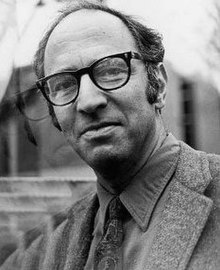
Back Thomas Kuhn Afrikaans توماس كون Arabic توماس كون ARZ Thomas Kuhn AST Tomas Kun Azerbaijani Томас Сэмюэл Кун Byelorussian Томас Кун Bulgarian টমাস স্যামুয়েল কুন Bengali/Bangla Thomas Kuhn Catalan Thomas Samuel Kuhn Czech
Thomas Kuhn | |
|---|---|
 Kuhn in 1973 | |
| Born | Thomas Samuel Kuhn July 18, 1922 Cincinnati, Ohio, US |
| Died | June 17, 1996 (aged 73) Cambridge, Massachusetts, US |
| Education | Harvard University (BSc, MSc, PhD) |
| Era | 20th-century philosophy |
| Region | Western philosophy |
| School | Analytic Historical turn[1] Historiographical externalism[2] |
| Institutions | Harvard University University of California, Berkeley Princeton University Massachusetts Institute of Technology |
| Thesis | The Cohesive Energy of Monovalent Metals as a Function of Their Atomic Quantum Defects |
Main interests | Philosophy of science History of science |
Notable ideas | |
Thomas Samuel Kuhn (/kuːn/; July 18, 1922 – June 17, 1996) was an American historian and philosopher of science whose 1962 book The Structure of Scientific Revolutions was influential in both academic and popular circles, introducing the term paradigm shift, which has since become an English-language idiom.
Kuhn made several claims concerning the progress of scientific knowledge: that scientific fields undergo periodic "paradigm shifts" rather than solely progressing in a linear and continuous way, and that these paradigm shifts open up new approaches to understanding what scientists would never have considered valid before; and that the notion of scientific truth, at any given moment, cannot be established solely by objective criteria but is defined by a consensus of a scientific community. Competing paradigms are frequently incommensurable; that is, they are competing and irreconcilable accounts of reality. Thus, our comprehension of science can never rely wholly upon "objectivity" alone. Science must account for subjective perspectives as well, since all objective conclusions are ultimately founded upon the subjective conditioning/worldview of its researchers and participants.
- ^ K. Brad Wray, Kuhn's Evolutionary Social Epistemology, Cambridge University Press, 2011, p. 87.
- ^ Alexander Bird, "Kuhn and the Historiography of Science" in Alisa Bokulich and William J. Devlin (eds.), Kuhn's Structure of Scientific Revolutions: 50 Years On, Springer, 2015.
- ^ Alexander Bird (2004). "Thomas Kuhn". Stanford Encyclopedia of Philosophy. Stanford University – via plato.stanford.edu. "Not all the achievements of the preceding period of normal science are preserved in a revolution, and indeed a later period of science may find itself without an explanation for a phenomenon that in an earlier period was held to be successfully explained. This feature of scientific revolutions has become known as 'Kuhn-loss'". The term was coined by Heinz R. Post in Post, H. R. (1971), "Correspondence, Invariance and Heuristics," Studies in History and Philosophy of Science, 2, 213–255.
- ^ "Transcendental nominalism" is a position ascribed to Kuhn by Ian Hacking (see D. Ginev, Robert S. Cohen (eds.), Issues and Images in the Philosophy of Science: Scientific and Philosophical Essays in Honour of Azarya Polikarov, Springer, 2012, p. 313).
- ^ Aviezer Tucker (ed.), A Companion to the Philosophy of History and Historiography, Blackwell Publishing, 2011 : "Analytic Realism".
- ^ a b c d e f g h i j Thomas S. Kuhn (1970). The Structure of Scientific Revolutions (PDF) (2nd ed.). Chicago and London: University of Chicago Press. ISBN 0-226-45803-2. Archived from the original (PDF) on January 29, 2016. Retrieved February 9, 2022.
- ^ Robert J. Richards, Lorraine Daston (eds.), Kuhn's 'Structure of Scientific Revolutions' at Fifty: Reflections on a Science Classic, University of Chicago Press, 2016, p. 47.
- ^ Burman, J. T. (2007). "Piaget No 'Remedy' for Kuhn, But the Two Should be Read Together: Comment on Tsou's 'Piaget vs. Kuhn on Scientific Progress'". Theory & Psychology. 17 (5): 721–732. doi:10.1177/0959354307079306. S2CID 145497321.
© MMXXIII Rich X Search. We shall prevail. All rights reserved. Rich X Search